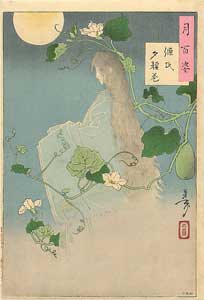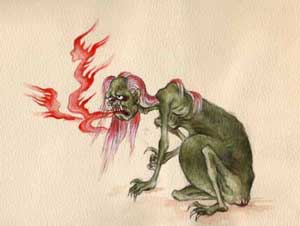Years ago I lived with neighbours who shared their small flat with three huge noisy dogs. There was lots of growling and barking day and night, and even more human voices shouting at the misbehaving pets. One day my neighbours perplexed me by their request to sign a petition against noisy dogs – not their dogs, as I quickly learned, but another new neighbour’s dog which occasionally joined their own three dogs’ concert.
The Japanese folklore knows many distinct types of ghosts. I remember a language class where we spent more than an hour to distinguish obake (お化け) and yurei (幽霊). In a nutshell, obake are said to be local nasty noisy creatures which are able to perform temporary transformations, something like a poltergeist. The yurei, in contrast, is not fixed to a specific location, but often personally related to some human being, your personal ghost so to say.
Although my childhood days with being scared of ghosts and monsters under the bed are long gone, I like the concept of obake and yurei, especially when transferred into our everyday life experience:
The obake are the conditions (and people) I encounter at certain places, they usually make my life a bit harder. The noisy neighbour, people around a seminar house who do not respect our room and practice, the local baker shop who always sold out my favourite croissant at any time of the day.
The yurei are my very personal demons, I take them with me wherever I go. My aversion against noisy dogs and neighbours, my fantasy about how exactly everyone around me should behave, my craving for certain things and conditions.
Just imagine what happens when my private yurei meet some local obake, we are well on the way towards quarrel, fight and disaster! In the worst case, if my emotional life mainly consists of walking my yurei to engage with some really nasty obake, I might turn into a ghost myself: a gaki (餓鬼) or “hungry ghost”.
Sitting at a table laid with delicious meals, yet with a throat too thin to swallow enough to fill my big empty stomach and my arms so long that I can reach everything I am craving for, but too long to feed my mouth. A never ending emotional struggle and starvation, neither pleasant for me nor for those around me.
In Zen practice, I find compassion is the most important and most difficult thing to learn. Surrounded by gaki, thetypical inhabitants of our modern consume-based society, I meet and get to know my yurei when sitting on my cushion. Knowing them well helps me to enjoy a happier life with an obake next door, and eventually I even have some food left for the gaki.


